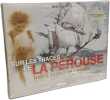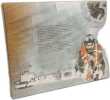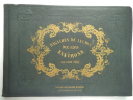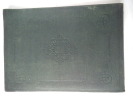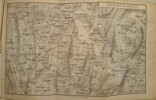-
Type
Book (1104)
Magazine (26)
Maps (3)
Photographs (2)
-
Latest
Last 24h (4)
Last 3 days (2)
Last month (24)
Last week (4)
-
Language
English (2)
French (1133)
-
Century
16th (1)
17th (1)
18th (25)
19th (134)
20th (242)
21st (76)
-
Countries
Belgium (127)
Canada (3)
Denmark (108)
France (818)
Switzerland (79)
-
Syndicate
ALAC (2)
ILAB (250)
NVVA (62)
SLACES (62)
SLAM (77)
"PASTEUR, LOUIS. - ANNOUNCING THE DISCOVERY OF ""MOLECULAR ASSYMETRY""
Reference : 47149
(1848)
Mémoire sur la relation qui peut exister entre la forme cristalline et la composition chimique, et sur la cause de la polarisation rotatoire"" (Extrait). (Séance du Lundi 22 Mai 1848).
(Paris, Bachelier), 1848. 4to. No wrappers. In: ""Comptes Rendus Hebdomadaires des Séances de L'Academie des Sciences"", Tome 26, No 21. Pp. (529-) 548. (Entire issue offered). Pasteur's paper: pp. 535-538.
First appearance of the announcement of Pasteur's momentous and revolutionary discovery of ""molecular assymetry"" and founding the science of Polarimetry.The discovery was first announced by Pasteur in may 1848 by the printing of the preliminary report of only 4 short pages, in order to establish priority (the paper offered). A more full exposition was published the same year in ""Annales de Chimie et de Physique"", 3me Series - Tome XXIV.""In 1848....Pasteur studied the crystals of tartrates (one of the substances that exhibited the now-clockwise, now-counterclockwise effect) under the microscope and found that the xcrystasls were mirror images of the others. The two crystals resemmbled each other as a right-hand glove resembles a left-hand glove....This was a revolutionary discovery and it took some courage to announce it. A few years before, the well-known chemist Mitscherlich had studies the same tartrate crystals and declared them all to be identical. Pasteur was only a twenty-sic-year-old unknown. neverthelless he announced his findings and went before Biot to repeat the separation ofthe crystals before the eyes of the aged authority in the field. Biot was convinced and Pasteur received the Rumford medal of the Royal Society for his work....Pasteur had thus founded the science of polarimetry in which the measurements of the manner in which the plane of polarized light was twisted could be used to help to determine the structure of organic substance, to follow various chemical reactions, and so on.""(Asimov). Leicester & Klickstein ""A Source Book of Chemistry"", p. 374-379).
"PASTEUR, LOUIS. - ANNOUNCING THE DISCOVERY OF ""MOLECULAR ASSYMETRY""
Reference : 49456
(1848)
Mémoire sur la relation qui peut exister entre la forme cristalline et la composition chimique, et sur la cause de la polarisation rotatoire"" (Extrait). (Séance du Lundi 22 Mai 1848).
(Paris, Bachelier), 1848. 4to. No wrappers. In: ""Comptes Rendus Hebdomadaires des Séances de L'Academie des Sciences"", Tome 26, No 21. Pp. (529-) 548. (Entire issue offered). Pasteur's paper: pp. 535-538. Clean and fine.
First appearance of the announcement of Pasteur's momentous and revolutionary discovery of ""molecular assymetry"" and founding the science of Polarimetry.The discovery was first announced by Pasteur in may 1848 by the printing of the preliminary report of only 4 short pages, in order to establish priority (the paper offered). A more full exposition was published the same year in ""Annales de Chimie et de Physique"", 3me Series - Tome XXIV.""In 1848....Pasteur studied the crystals of tartrates (one of the substances that exhibited the now-clockwise, now-counterclockwise effect) under the microscope and found that the xcrystasls were mirror images of the others. The two crystals resemmbled each other as a right-hand glove resembles a left-hand glove....This was a revolutionary discovery and it took some courage to announce it. A few years before, the well-known chemist Mitscherlich had studies the same tartrate crystals and declared them all to be identical. Pasteur was only a twenty-sic-year-old unknown. neverthelless he announced his findings and went before Biot to repeat the separation ofthe crystals before the eyes of the aged authority in the field. Biot was convinced and Pasteur received the Rumford medal of the Royal Society for his work....Pasteur had thus founded the science of polarimetry in which the measurements of the manner in which the plane of polarized light was twisted could be used to help to determine the structure of organic substance, to follow various chemical reactions, and so on.""(Asimov). Leicester & Klickstein ""A Source Book of Chemistry"", p. 374-379).
Recherches sur les relations qui peuvent exister entre la forme cristalline, la composition chimique et le sens de la polarisation rotatoire. (+) Note sur la Cristallisation du soufre. (Memoir on the relation that can exist between crystalline form an...
Paris, Victor Masson, 1848 a. 1851. 8vo. 2 contemp. hcalf, raised bands, gilt spine. Light wear along edges. Small stamps on verso of titlepages and on verso of 1 plate. In ""Annales de Chimie et de Physique"", 3me Series - Tome XXIV and XXXI. (6),512 pp. and 2 plates + 512 pp. a. 4 plates.(2 entire volumes offered). Pasteur's papers: pp. 442-459 a. pp. 459-460, 1 double-page folded engraved plate + pp. 67-102 a. 1 plate. Some scattered brownspots to first part of the first volume, not affecting P's papers.
First full exposition of Pasteur's momentous and revolutionary discovery of ""molecular assymetry"" and founding the science of Polarimetry.The discovery was first announced by Pasteur in may 1848 by the printing of the preliminary report of only 4 short pages, in order to establish priority. The announcement - 4 pages - was published in Comptes rendus hebdomadaires de l’Académie des Sciences, Paris, Seance of May 15, 1848, 26 (21), 535-538 (Published on May 1848).""In 1848....Pasteur studied the crystals of tartrates (one of the substances that exhibited the now-clockwise, now-counterclockwise effect) under the microscope and found that the crystals were mirror images of the others. The two crystals resembled each other as a right-hand glove resembles a left-hand glove....This was a revolutionary discovery and it took some courage to announce it. A few years before, the well-known chemist Mitscherlich had studies the same tartrate crystals and declared them all to be identical. Pasteur was only a twenty-sic-year-old unknown. neverthelless he announced his findings and went before Biot to repeat the separation ofthe crystals before the eyes of the aged authority in the field. Biot was convinced and Pasteur received the Rumford medal of the Royal Society for his work....Pasteur had thus founded the science of polarimetry in which the measurements of the manner in which the plane of polarized light was twisted could be used to help to determine the structure of organic substance, to follow various chemical reactions, and so on.""(Asimov). Leicester & Klickstein ""A Source Book of Chemistry"", p. 374-379).
"PASTEUR, (LOUIS) et (JULES) JOUBERT - THE FIRST DOCUMENTED DISCOVERY OF AN ANTIBIOTIC.
Reference : 48136
(1877)
Charbon et septicémie.
(Paris, Gauthier-Villars), 1877. 4to. No wrappers. In: ""Comptes Rendus Hebdomadaires des Séances de L'Academie des Sciences"", Tome 85, No 3. Pp. (101-) 168. (Entire issue offered). Pasteur & Joubert's paper: pp. (101-) 115.
First appearance of one of the founding papers in the realm of antibiotics, being the discovery of ""Vibrion septique"" (Cl. septicum), the first pathogenic anaerobe to be found. ""Pasteur and Joubert were probably the first to realize the practical implications of antibiosis. They noted the antagonism between Bacillus anthracis and other bacteria cultures (in the paper offered)""(Garrison & Morton: No. 1932.1 and 2490).
Animalcules infusoires vivant sans gaz oxygène libre et déterminant des fermentations.
(Paris, Mallet-Bachelier), 1861. 4to. No wrappers. In: ""Comptes Rendus Hebdomadaires des Séances de L'Academie des Sciences"", Tome 52, No 8. Pp. (321-) 368. (Entire issues offered). Pasteur's paper: pp. 344-347. Minor marginal brownspots.
First printing of a milestone paper in microbiology, being the paper in which Pasteur disclosed his discovery of organisms that lived without oxygen. Two years later he named them anaerobic or zymics, contrasting to aerobic which only lived in the presence of free oxygen.""In 1861 he turned his attention to the butyric fermentation and made another importent discovery, viz. that this fermentation proceeds in the absence of oxygen. In the fermented material he found cylindrical rods, which he showed were the cause of the fermentation. Following the nomenclature and ideas of the time he regarded them as animal in character and named them Vibrio..."" (Bullock ""The History of Bacteriology"", p. 61).
Oeuvres complètes.
Paris, Cercle du Livre Précieux, 1966. 5 volumes in-8, format oblong, pleine reliure verte, 312-341-436-545 et 524 pages, plus une table et des notes par volume.
Edition originale des Oeuvres complètes réalisée d'après les maquettes de Bruno Pfäffli pour le compte des Editions Tchou. Exemplaire sur numéroté sur vélin. Trsè bel exemplaire en PARFAIT état. Tome 1 : Récits. Les instants bien employés suivis de Jean Paulhan, voyageur et conteur ou le Monde inconnu par André Dhôtel. (Lalie. - Progrès en amour assez lents - Le Pont traversé. - Le Guerrier appliqué.- La guérison sévère. - Aytré qui perd l'habitude. - La métromanie ou les dessous de la capitale.- Les Causes célèbres. - Guide d'un petit voyage en Suisse. - L'aveuglette. - De mauvais sujets. - Une semaine au secret. - 13 Entretien à la radio avec Robert Mallet. Etc., etc...) Photos sur demande.
"PAYEN, A. et J.F. PERSOZ - DISCOVERY OF THE FIRST ENZYME, DIASTASE.
Reference : 51493
(1833)
Mémoire sur la diastase, les principaux produits de ses réactions et leurs applications aux arts industriels"" (Memoir on diastase, the principal products of its reactions, and their applications to the industrial arts),
Paris, Crochard, 1833. Contemp. hcalf. Raised bands, gilt spine with gilt lettering. A few scratches to spine. Stamps to verso of titlepage. In: ""Annales de Chimie et de Physique, Par MM. Gay-Lussac et Arago."", Series 2, tome 53. Entire volume offered. 448 pp. Payen & Persoz's paper: pp. 73-92. Clean and fine.
First printing of a pioneering paper in industrial chemistry and microbiology, being the discovery of the first Enzyme, Diastase. It catalyses the breakdown of starch into maltose.
Terre de paysans. Découverte d'une planète rurale. Héliogravures dans le texte.
Ed. Cabédita 1994. Bel exemplaire broché, in-8, 175 pages.
La Découverte du pôle Nord en 1909, sous le patronage du Club arctique Peary. […] Introduction de Théodore Roosevelt.
Paris, Pierre Laffitte, 1911. In-4° de 341, 1 bl., [2] pp. Portrait en phototypie de l'auteur en front., 32 pages d'illustration photographique en 2 couleurs et 32 pages de photographies en noir. Demi-toile bleue, pièce de titre en maroquin brun, couverture et dos conservés Ex-libris ms. « Hasselmann ».
Première édition française du récit de l’expédition polaire conduite par l’explorateur américain Robert Edwin Peary (1856-1920), qui revendiqua la conquête du pôle Nord le 6 avril 1909, accompagné de Matthew Henson et de quatre Inuits. Traduit de l’édition américaine de 1910 (The North Pole), l’ouvrage relate les préparatifs, les conditions extrêmes de la traversée de la banquise arctique et la marche finale vers le 90° nord. Illustré de nombreuses cartes et photographies, il est précédé d’une introduction élogieuse de l’ancien président Theodore Roosevelt, soutien de Peary. Témoignage majeur de l’histoire des explorations polaires et pièce importante de la controverse sur la véritable découverte du pôle Nord. M8-B
Découverte de la Mer
La Belle Edition.1960.In-8,couv.rempliée ill.en couleurs.229 p.non coupées.Pointe-sèches ,et aquarelles de Raoul Serres.Ex.997.BE.
"PELLETIER, PIERRE et JOSEPH CAVENTOU. - THE DISCOVERY OF STRYCHNINE.
Reference : 43871
(1818)
Note sur un nouvel Alcali (Lu à l'Academie des Sciences le 10 août 1818. (+) Mémoire Sur un nouvel Alcali végétal (la Strychine) trouvé dans la fève de Saint-Ignace, la noix vomique, etc. (Lu à l'Academie des Sciences le 14 décembre 1818).
(Paris, Crochard, 1818,1819). No wrappers. In: ""Annales de Chimie et de Physique, Par MM. Gay-Lussac et Arago."", tome 8 (Cahier 3) a. 10 ( Cahier 2), pp. 225-336 and pp. 129-240. (Entire issues offered). Pelletier & Caventou's papers: pp. 323-324 (tome 8) and pp. 142-176 (tome 10). A few scattered brownspots.
First printing of these classic papers in chemistry in which the authors announced their discovery of Strychnine. This was the first alkali of vegetable origin to be discovered after morphine. This discovery (and their discovery of chlorophyll) brought them international fame. The first small paper contains the announcement of the discovery and the second long memoir contains the elaborate exposition of the discovery.""Strychnine was only the second alkaloid to be extracted, the first was morphine. Pelletier and Caventou wanted to name their new alkaloid vauqueline after Nicolas Vauquelin, one of their associates who had refined the technique of ether extraction for use in isolating alkaloids. However, the officers of the Académe des Sciences in Paris rejected the idea on the grounds that a respected scientist’s name should not be paired with a deadly poison. In addition to strychnine the pair isolated other important compounds from plants including caffeine, chlorophyll and the anti-malaria drug quinine. (Paul L. Burnham).Parkinson:""Breakthroughs"", 1818 C. - Garrison & Morton: 1846.The first issue also contains their importent memoir ""Examen chimique de la Cochenillee et de sa matière colorante"", pp. 250-287 which describes how they obtained crotonic acid from croton oil and analyzed carmine in the cochineal.
"PELTIER, JEAN CHARLES A. - DISCOVERY OF THE ""PELTIER-EFFECT""
Reference : 43654
(1834)
Nouvelle Expériences sur la Caloricité des courans électriques.
(Paris, Crochard, 1834). No wrappers. In: ""Annales de Chimie et de Physique"", 2. Series, Tome 56, Cahier 4 (last issue of tome 56). Entire issue offered. Pp. 337-444. Peltier's paper: pp. 371-386. The text calls for a plate, but not present here.
First printing of the paper in which Peltier describes his discovery of the ""Peltier-Effect"", the thermo-electric cooling and heating of an electrical junction dependent on the direction of the current.""Stimulated by the work of Nobili, Peltier constructed a sensitive galvanometer to measure the conductivities of antimony and bismuth for small currents. Peltier's use of small samples of these nonductile materials was fortunate because the anomalous behavior of these materials led him to construct a thermoelectric thermoscope and to measure the temperature distribution along a series of thermocouple circuits. He discovered that a cooling effect can take place at one junction and an excessive heating at the other. He then confirmed this discovery by using an air thermometer in place of the thermoscope. Peltier did not pursue the effect he had discovered, and its importence was not fully recognized until after the thermodynamic work of William Thomson twenty years later.""(DSB X, p. 500).Wheeler Gift no 2684. - Ronald's Library, p. 389. - Parkinson ""Breakthroughs"" 1834 P.
Sur les traces de La Pérouse : Carnets d'expédition à Vanikoro
Glénat 2006 in4. 2006. Cartonné jaquette.
Comme neuf encore sous son plastique d'emballage
Vie du Bienheureux Jean-Gabriel Perboyre, prêtre de la Congrégation de la Mission, par un prêtre de la même Congrégation.
Lille, Desclée, de Brouwer & Cie, s. d., env. 1900, in-8vo, front. + 180 p., + 13 planches (illustrant des supplices chinois et avec un vue de Macao), reliure demi-cuir, abîmée.

(SLACES, NVVA)
Phone number : 41 (0)26 3223808
L'ADN decrypté . La découverte et les preuves du langage caché de l'ADN
1999 1999, preface de Jean Marie Pelt president de l'institut Europeen d'ecologie Marco Pietteur , Resurgence , broché 398 pages comme neuf .
Ray F1*
Mémoires. Publiés avec des documents inédits, un avant-propos et un épilogue par M. H. de LAIRE, comte dEspagny. Ornés dun portrait de lauteur. Troisième édition.
Paris, Plon, 1896. In-8° ; portrait, XX-512 pp. ; demi-chagrin vert, dos à nerfs orné de filets à froid (rel. ép.).
Ardent bonapartiste, Persigny fut tout dévoué au prince Louis-Napoléon quil aidera à devenir et à rester empereur. Il sera deux fois ministre de lIntérieur, et ambassadeur à Londres. Ses Mémoires nous montrent son rôle depuis décembre 1848 jusquà 1866 ; sa personnalité, attachante, mérite infiniment mieux que sa réputation.Qq. piqûres sur les tranches, rousseurs claires sans gravité sur le portrait, bon exemplaire. Photos sur demande.
La Commune en Images 1871.
P., François Maspéro, 1982, 1 vol. in-8 carré (180 x 180) broché sous couverture illustrée, de 84 pp. 1 coin légèrement écorné, bel exemplaire par ailleurs.
Collection "Petite Collection Maspéro / La Découverte". Cinquante illustrations d'époque : photographies, gravures, affiches. Une chronologie. Des récits des témoins, acteurs célèbres ou anonymes.
BAGNERES DE LUCHON et ses environs
In 4 à l’italienne pleine toile verte de l’éditeur, titre et fer doré, filets à froid en encadrement sur le premier plat. Filets avec médaillon central, à froid sur le deuxième plat. 30 lithographies originales de l’auteur, sous serpentes. Titre illustré d’une lithographie originale en médaillon, l’hospice de LUCHON, de l’auteur. 1) Vallée de Saint Bertrand de Comminges 2) Haute chaine des Pyrénées 3) Vallée de Luchon et montagne de Superbagnères 4) Bagnères de Luchon Vue prise au dessus de BARCUGBAS. 5 et 6 Panorama de la vallée de Bagnères de Luchon. 7) Etablissement de Bagnères de Luchon Vue prise au dessus du pavillon de la Ruvette. 9) Allée d’Etigny. 10) chalets de l’allée d’Etigny 11, 12 et 13) 3 planches dépliantes Vallée de Luchon et vallée d’Oueil- Vallée de la Pique et Val de Burbe- glacier et vallée du Lys (une petite partie de la marge supérieure, poussiéreuse) 14) Cirque de la vallée du Lys 15) Cascade du Cœur 16 et 17(non numérotée) planche double Vallée du Lys cascade d’enfer. 18) vue prise de la ligne de faîte d’Antenac 19) Saint Beat 20) Défilé du Port du Roi 21) village de Bosost et vallée d’Aran. 22) glaciers de la vallée d’Astan 24) Cascade des demoiselles vallée de la Pique 25 Cascade du Parisien, vallée de la Pique. 26 Haute vallée de la Pique, de Luchon 27) Passage du port de Vénasque vus prise de la rive du lac. 28 et 29 Panorama Glaciers pic de Néthou versant oriental de la Madaletta –glaciers et pied de la Maladetta versant septentrional. 30 Vue de Petite ville de Venasque –Espagne. Dulon libraire éditeur à Bagnères de Bigorre, sans date. A signaler une très pâle mouillure en marge supérieure des planches 22 à30 avec un très léger débordement aux trois dernières. Une pliure d’un panorama renforcée. Sinon Bon exemplaire.
ANNECY et ses Environs.
Nouvelle édition, revue et corrigée par l'auteur, avec une carte repliée des Environs D'Annecy. Annecy, Imprimerie de Louis Thésio, 1860. In-12 (17x11,5cm) broché de couverture d'origine. 288pp. + Carte. + Annonces.
Nouvelle édition, bon état
"Le guide du promeneur, 19e arrondissement : La Villette; Belleville; Les Buttes-Chaumont; Flandre."
Paris, Editions Parigramme, 1994. 14 x 21, 213 pp., quelques planches en couleurs, 1 plan, broché, très bon état.
Photographies de Jacques Lebar.
Philippe Minard Collectif Philippe Minard Michel Vovelle
Reference : 8260
(1991)
ISBN : 2707120502
Recherches sur la Révolution
La Découverte/ CNRS 1991 440 pages in8. 1991. Broché. 440 pages. Recherches sur la Révolution est un ouvrage collectif dirigé par Michel Vovelle avec des textes rassemblés par Antoine de Baecque. Il constitue un bilan des travaux scientifiques réalisés à l'occasion du bicentenaire de la Révolution française fruit d'un séminaire tenu à la Sorbonne entre 1989 et 1990
Très bon état
 Write to the booksellers
Write to the booksellers



![La Découverte du pôle Nord en 1909, sous le patronage du Club arctique Peary. […] Introduction de Théodore Roosevelt.
. PEARY (Robert).](https://static.livre-rare-book.com/pictures/PHO/pho-2079_1_thumb.jpg)
![La Découverte du pôle Nord en 1909, sous le patronage du Club arctique Peary. […] Introduction de Théodore Roosevelt.
. PEARY (Robert).](https://static.livre-rare-book.com/pictures/PHO/pho-2079_2_thumb.jpg)
![La Découverte du pôle Nord en 1909, sous le patronage du Club arctique Peary. […] Introduction de Théodore Roosevelt.
. PEARY (Robert).](https://static.livre-rare-book.com/pictures/PHO/pho-2079_3_thumb.jpg)



